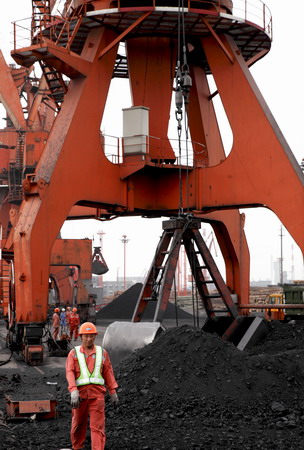Companies
Shenhua Group in $8b Xinjiang coal projects
Updated: 2011-08-11 09:59
By Du Juan (China Daily)
|
 |
|
Shenhua Group Co Ltd has annual coal production of 20 million tons in the Xinjiang Uyghur autonomous region. The company also plans to invest 3.2 billion yuan this year in the province. [Photo / Bloomberg] |
According to the company's plan, by the end of 2015, Shenhua will reach 70 million tons of annual coal production and build a coal-to-oil conversion plant with annual production capacity of 3 million tons.
Shenhua has 20 million tons of coal production annually in Xinjiang and it will invest 3.2 billion yuan in 2011 in 18 projects in the region, the company said.
During the 12th Five-Year Plan (2011-2015) period, Shenhua will invest a total of 109.5 billion yuan in Xinjiang to develop its coal, power, coal-to-oil and railway construction sectors. Among them, the coal-to-liquid fuel sector takes up about half of the investment.
According to its expansion plans, the company will build coal-to-oil conversion plants with a designed production capacity of 10 million tons in Ganquanbao industrial park in Urumqi, the capital of Xinjiang.
The company is waiting for official approval of the project, said Wang Ningbo, vice-general manager of Shenhua Xinjiang Energy Co Ltd.
"Hopefully, we will get the approval by the end of this year and the construction of the first 300 tons of coal-to-oil project will start in May 2012."
Shenhua owns the Heishan open-pit mine with annual coal production of 10 million tons in Turpan in the middle of Xinjiang.
At the beginning of 2011, the company planned to invest 338 million yuan to start water, electricity and office building construction in the coalmine area. However, the coalmine is an auxiliary project for the coal-to-oil conversion project in Urumqi. "We cannot start coal production in Heishan until we get the approval because it is a key coal supplier for the coal-to-oil projects in Xinjiang," Wang said.
Shenhua said it is the only operator to obtain approval to develop coal-to-oil projects in China. Its first such project with 1 million tons of coal-to-liquid capacity in Inner Mongolia autonomous region has already made profits.
Zhang Yuzhuo, general manager of Shenhua Group, said the Inner Mongolia coal-to-oil project produced 216,000 tons of oil in the first quarter and profits stood at more than 100 million yuan, Xinhua News Agency reported in May.
The company said the coal chemical industry, including coal-to-oil projects, would expand and become more prosperous in Xinjiang where it is estimated to have 2,190 billion tons of coal, accounting for 40 percent of the country's total reserve. Some experts said coal-to-oil conversion is unprofitable because of wastage during the production process.
"The process of coal-to-oil conversion produces wastages in coal and water, which has a bad impact on the environment," said Lin Boqiang, director of the China Center for Energy Economics Research at Xiamen University.
"There must be more economical ways to find a substitute for oil instead of coal-to-liquid fuel," he said. "The technology is not mature enough. The industry still lacks standards on quality and cost management."

Specials

Star journalist leaves legacy
Li Xing, China Daily's assistant editor-in-chief and veteran columnist, died of a cerebral hemorrhage on Aug 7 in Washington DC, US.

Beer we go
Early numbers not so robust for Beijing's first international beer festival

Lifting the veil
Beijing's Palace Museum, also known as the Forbidden City, is steeped in history, dreams and tears, which are perfectly reflected in design.